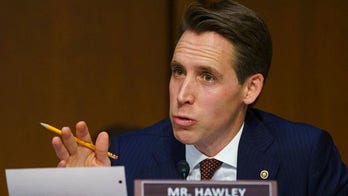Fox News Flash top headlines for June 17
Fox News Flash top headlines are here. Check out what's clicking on Foxnews.com.
The Department of Justice is pushing Congress to pass new legislation that would hold Facebook, Twitter and other tech behemoths accountable for what is posted on their platforms – a move that if passed would roll back protections Silicon Valley has had for decades.
The Justice Department’s proposals, unveiled Wednesday afternoon, want online platforms to better police their sites for illicit and harmful material, and to take a more objective approach in deciding what content they deem objectionable and decide to take down. The DOJ, in a news release, said it was calling for lawmakers to "update the outdated immunity for online platforms" under Section 230 of the Communications Decency Act of 1996.
“These reforms will ensure that Section 230 immunity incentivizes online platforms to be responsible actors,” Attorney General William P. Barr said in a statement. “These reforms are targeted at platforms to make certain they are appropriately addressing illegal and exploitive content while continuing to preserve a vibrant, open, and competitive Internet.
He added: “These twin objectives of giving online platforms the freedom to grow and innovate while encouraging them to moderate content responsibly were the core objectives of Section 230 at the outset."
NBC NEWS UNDER FIRE FOR APPARENTLY PUSHING GOOGLE TO REMOVE CONSERVATIVE SITES FROM AD PLATFORM
Section 230 refers to a part of the Communications Decency Act of 1996 that gave tech companies the sweeping protections they currently enjoy. The companies are given a broad ability to monitor their sites as they see fit and are generally not held liable for actions their users take on the sites.
The DOJ’s proposal wants Section 230 to hold tech companies liable for material used in criminal acts like child sex trafficking.
“Criminals and other wrongdoers are increasingly turning to online platforms to engage in a host of unlawful activities, including child sexual exploitation, selling illicit drugs, cyberstalking, human trafficking, and terrorism,” the proposal states.
CLICK HERE TO GET THE FOX NEWS APP
It continues: “The time has therefore come to realign the scope of Section 230 with the realities of the modern internet so that it continues to foster innovation and free speech but also provides stronger incentives for online platforms to address illicit material on their services.”
The DOJ’s proposal comes as President Trump and many conservative lawmakers in Congress have been sharply critical of the alleged bias by tech companies against right-wing material on their platforms.
Sen. Josh Hawley, R-Mo., introduced legislation Wednesday to give Americans the ability to sue major tech companies like Facebook, Google and Twitter if they engage in selective censorship of political speech.
The Limiting Section 230 Immunity to Good Samaritans Act, cosponsored by Sens. Marco Rubio, R-Fla., Mike Braun, R-Ind., and Tom Cotton, R-Ark., would stop such companies from receiving immunity under section 230 of the Communications Decency Act, unless they update their terms of service to promise to operate in good faith.
CHRIS COX IS RETURNING TO FACEBOOK AS CHIEF PRODUCT OFFICER
“For too long, Big Tech companies like Twitter, Google and Facebook have used their power to silence political speech from conservatives without any recourse for users,” Hawley said in a statement. “Section 230 has been stretched and rewritten by courts to give these companies outlandish power over speech without accountability. Congress should act to ensure bad actors are not given a free pass to censor and silence their opponents.”
Trump signed an executive order this month that interprets Section 230 as not providing statutory liability protections for tech companies that engage in censorship and political conduct -- though DOJ officials say the department has been working on the legislative recommendations for months and they are not a direct result of Trump’s order.
"My executive order calls for new regulations under Section 230 of the Communications Decency Act to make it so that social media companies that engage in censoring any political conduct will not be able to keep their liability shield," the president said at the time.
ZOOM TEMPORARILY SHUTS DOWN ACTIVIST'S ACCOUNT AFTER ITS TIANANMEN SQUARE CRACKDOWN REMEMBRANCE
The president's order, which also cuts federal funding for social media platforms that censor users' political views, came after Twitter took the unprecedented step of slapping a "misleading" warning label on two of Trump's tweets concerning the fraud risks of nationwide mail-in balloting.
Some lawmakers, including House Speaker Nancy Pelosi, D-Calif., have already begun pondering rollbacks to Section 230, and a bipartisan group of senators currently is pushing legislation to force Internet companies to take more stringent steps to block online child sexual exploitation in order to qualify for full protection under the provision.
Fox News’ Adam Shaw contributed to this report.







